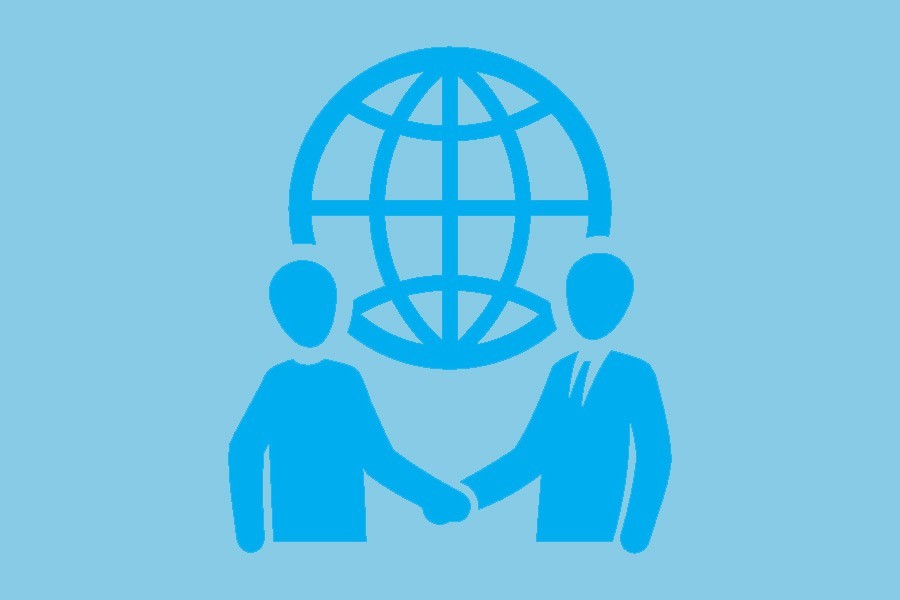
Published :
Updated :

It feels good to learn from none other than the Director General of the World Trade Organisation (WTO) that during the two pandemic-ravaged years, member countries of the WTO have exercised restraint and refrained from taking protectionist measures that otherwise would have left a disastrous impact on global trade in goods and services. The DG said this while presenting the WTO's mid-year report on trade-related developments on July 29. Although the statement regarding restraint is not right on the button, as exceptions to restraint has been in sight here and there, the fact remains that there was indeed no notable stepping up in trade impeding protectionist practices. Now, how far this restraint from overdoing --- a practice at times resorted to by some countries even whimsically --- has actually been a respite is difficult to measure. Still, one has reasons to believe that things would have been far worse had strong protectionist policies restricted the flow of trade globally. The DG, however, said that "some pandemic-related trade restrictions do remain in place and the challenge is to ensure that they are indeed transparent and temporary."
The mid-term report looks at major developments in trade policy between mid-October 2020 and mid-May 2021, and includes dedicated sections on measures related to the ongoing COVID-19 pandemic. Complementing her statement with reference to the report, DG Ngozi Okonjo-Iweala said, "The multilateral trading system has shown resilience despite the severity of the global health and economic crisis caused by the COVID-19 pandemic. As a platform for transparency, the WTO has a central role to play in ensuring that supply chains are kept open-which is an essential part of increasing vaccine production and distribution on the scale needed to end the pandemic. WTO members must show collective leadership, act to ensure that markets remain open, and work together to achieve a successful outcome at the 12th Ministerial Conference (MC12)." Referring to some key issues highlighted in the report, she said that although the value of global merchandise trade shrunk by around 8.0 per cent in 2020, trade in medical supplies increased by 16 per cent, and personal protective equipment (PPE) by nearly 50 per cent. Merchandise trade volumes surpassed pre-pandemic levels earlier this year. Commercial services trade has been slower to recover, weighed down by travel and transport restrictions, she added.
The report highlights that world trade and output have recovered faster than expected since the second half of 2020, after falling sharply during the first wave of the pandemic. Strong monetary and fiscal policy support from governments, and the arrival of effective vaccines against COVID-19, have been important factors in the rebound. Leading indicators point to a sustained expansion of merchandise trade in the first half of 2021.
Despite these positive developments, the report draws attention to the serious threat that COVID-19 continues to pose to the global economy and public health, as vaccine production remains insufficient, contributing to significant disparities across countries. This is especially true for low-income developing economies, which are struggling to obtain enough doses to inoculate more than a small fraction of their populations.
The report, which was reviewed at a meeting of the WTO's Trade Policy Review Body, notes that since the outbreak of the pandemic, 384 COVID-19-related trade measures in the area of goods have been implemented by WTO members, of which 248 (65%) were of a trade-facilitating nature and 136 (35%) could be considered trade restrictive. Several of these measures, originally introduced in immediate response to the pandemic, have been extended during the review period (mid-October 2020 to mid-May 2021).
Export restrictions accounted for 84 per cent of all restrictive measures recorded. The reduction or elimination of import tariffs and import taxes accounted for 60 per cent of trade-facilitating measures taken, and several members reduced their tariffs on a variety of goods such as personal protective equipment (PPE), sanitisers, disinfectants, medical equipment and medicines/drugs. Some members and observers severely affected by successive waves of the pandemic have also eliminated import tariffs on certain goods necessary to fight COVID-19, such as oxygen, oxygen canisters, and active substances. The trade coverage of COVID-19-related trade-facilitating measures implemented since the beginning of the pandemic was estimated at USD 291.6 billion, while that of the COVID-19-related trade-restrictive measures stood at USD 205.8 billion. According to preliminary estimates by the WTO Secretariat, the trade coverage of the trade-facilitating measures still in force (USD 179.6 billion) remains higher than that of the trade-restrictive measures (USD 106.0 billion).
The report also states that member countries introduced 122 non-COVID-19-related measures affecting trade in services of which mostly were trade facilitating in nature. However, some new policies appeared to be trade restrictive, including measures affecting communication and network enabled services, and policies pertaining to the screening of foreign investment in areas deemed strategic.
The mid-year report covers several other important trade-related developments that took place during the review period, including fisheries subsidies, electronic commerce, investment facilitation, women's economic empowerment, domestic regulation in services and micro, small, and medium-sized enterprises (MSMEs).
The mid-year report reflects not-so-scary a situation. What, however, is notable in the report is WTO's expectation from the members' collective action and leadership for global good. Clearly, it is the big members who are meant to play the role. In this context, one must say that restraint in not being over-protective is not alone going to help.
Although the report is meant to take stock of the developments in the arena of trade, one feels there should have been a pathway, including actions being taken by the global body, especially for the less advanced members, who are not only reeling under the pandemic, but are stuck in a situation where some innovative moves could be meaningful for them to stay afloat.


 For all latest news, follow The Financial Express Google News channel.
For all latest news, follow The Financial Express Google News channel.